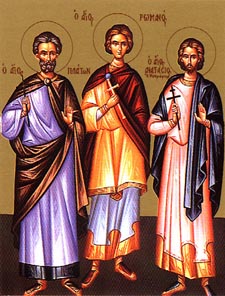|
|||
|---|---|---|---|
| This weekly bulletin insert complements the curriculum published by the Department of Christian Education of the Orthodox Church in America. This and many other Christian Education resources are available at http://dce.oca.org. | |||

Luke 17: 20-37 contain one of Jesus' extended teachings, and gives us a lot to think about. Jesus is answering a question that the Pharisees have posed to Him: When will the Kingdom of God come? They seem to expect that the time of its coming will be clearly marked with signs, and Jesus wants them to understand that this is not the kind of Kingdom they should expect or seek. So He tells them, "The Kingdom of God is not coming with signs to be observed; nor will they say, 'Lo, here it is!' or 'There!' for behold, the kingdom of God is in the midst of you." He is describing the Kingdom as a reality that is already present, both in His Person and in their hearts if they are ready to follow Him. Nor should they be deceived about His Second Coming, going along with anyone who tells them, "Lo, there!" or "Lo, here!" Don't go with such people, because the coming of the Son of Man "in His day" will be as clear as when the "lightning flashes and lights up the sky from one side to the other." But before that, many other things must happen, including His suffering and rejection by His own generation. When they ask Him not when but where His words will be fulfilled, He gives an indirect answer, but one that uses plain language: The Second Coming will be evident, as unmistakable as when vultures gather around a carcass. The Holy Martyr Plato (or Platon) also used plain words, especially comparisons, to help people understand the Gospel. Many times he used these comparisons to challenge the thinking of those he encountered. For example, living as he did in a time of persecution of Christians, he like many others was tortured for his faith. He told his persecutors to be even harsher, so that the comparison between their inhumanity and his endurance could be more clearly seen, providing evidence that a believer would undergo any suffering for the truth of Christ. When one of his jailers spoke admiringly of the famous philosopher Plato, he was quick to say that he and that earlier Plato were alike in name only: "I learn and teach to others the wisdom of Jesus Christ; that philosopher taught the wisdom that is folly." He was referring to the words of Saint Paul in I Corinthians 1: 22-25.
Denied food or drink for eighteen days, he managed to survive and retain consciousness. When his jailers expressed their amazement, he told them, "You get your satisfaction from food; mine comes from prayer to God. You take joy in wine, but I rejoice in Christ, Who is the true Vine." We know that silence can sometimes be more powerful than words. But plain words, carefully chosen and readily understandable, can express the lofty truths that form our faith. |
|||
